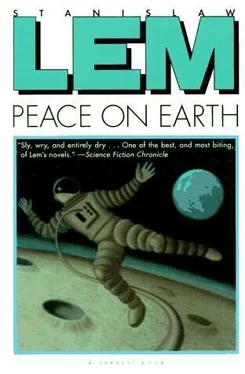“I guess not.”
“So you see.”
“All right. But the uncanny resemblance. Was she — human?”
“Yes and no. Not directly. Do you want to see her? She’s lying in that room.” He pointed to the door behind him. For a second I had the mad thought that Marilyn Monroe had died a second death.
“A product of Gynandroics?” I asked slowly.
“A different company. There are others. Would you like to see her?”
“No,” I said. “But someone must have been… steering her?”
“Of course. Probably a woman, and one with great acting ability. The way she moved — did you notice? — was perfect. An amateur couldn’t have done it. To render her so well, to capture the spirit, must have taken a lot of study. Practice. Going over the old movies…” He shrugged.
“They went to all that trouble…” I said. “For what?”
“Would you have picked up an old lady?”
“Yes.”
“But you wouldn’t have stayed for the pizza. Anyway, not for sure, and they had to be sure. And you couldn’t refuse a Marilyn Monroe, could you? But enough said.”
“What did you… do to her?”
“Nothing. A disconnected remote is a puppet with the strings cut. A doll.”
“But then why did she run?”
“Because the product can tell you things. They didn’t want to leave any evidence, any prints. It’s almost three. You must take care of yourself, Mr. Tichy. You have, if you will forgive me, old-fashioned tastes in women. I wish you a good night and pleasant dreams.”
The next day was a Sunday. We didn’t work on Sundays. I was shaving when a messenger arrived with a letter. Professor Lax-Gugliborc wanted to see me. I had heard of him. His field was communications and telematics. He had his own laboratory at the base. I dressed and at ten o’clock went to his place. He had drawn me a little map on the other side of the letter. Among some low buildings stood a long pavilion surrounded by a garden and a high wire fence. I pushed the bell once, twice. A sign lit up above it: I’M NOT AT HOME TO ANYONE. Then the lock buzzed and the gate opened. A narrow gravel path led to a metal door. It was closed and had no knob or handle. I knocked. Not a sound inside. I knocked again. I was about to leave when the door opened a little and a man peered out, tall, thin, in a blue smock covered with spots and splatters. What was left of his white hair was cut very short, and he wore thick glasses that gave him the look of a startled fish. A long sniffy nose, a massive forehead.
He stepped back without a word to let me in, then locked the door and not with just one lock either. The hallway was very dark. He went first and I followed, my hand on the wall. This was strange, conspiratorial. The stink of chemicals hung in the hot, dry air. The next door was a sliding door. He had me go first.
I found myself in a large lab that was incredibly cluttered. Metal apparatuses, oxidized black, were piled one on top of the other and connected with wires that lay tangled on the floor. In the middle of the lab was a table heaped with more equipment, papers, tools, and a cage stood next to it, a birdcage large enough to hold a gorilla. The most curious thing was the dolls lying in a row along three of the walls. Naked, resembling store mannequins, with open skulls or with no heads at all, and their chests parted like doors, containing a jumble of connectors and circuit boards, and under the table was a pile of arms and legs. There was not one window in the room. The professor threw on the floor a coil of cable and electronic parts occupying a chair, and with an agility I wouldn’t have expected of him he crawled under the table, pulled out a tape recorder, and turned it on. Looking up at me, he put a finger to his lips, and at the same time his strident voice came from the machine:
“I have invited you here, Tichy, to instruct you in a few things you must know about communications. Please have a seat and listen. You may not take notes…”
While his voice went on, the professor gestured for me to get in the cage. I hesitated. Without ceremony he pushed me in, climbed in after me, and pulled my arm to make me sit. He sat opposite me on the floor, crossing his legs, his sharp knees jutting from his smock. The whole thing was like a scene out of a bad movie about a mad scientist. In the cage too there were wires going everywhere, and he brought two together, which made a quiet, monotonous buzz. Meanwhile his voice spoke on the machine by the chair. Lax-Gugliborc reached behind him for two thick black collars. One of these he pulled over his head and around his neck, and gave me the other and indicated that I do likewise. Then he took a wire with an olive-shaped plug and put the plug in his ear, and again in pantomime told me to do the same. The tape recorder went on speaking, but in my ear I heard what he said to me.
“Now we can talk. You may ask questions but only intelligent ones. No one will hear us. We are shielded. You are surprised? No need to be. Even the trusted are not trusted, and that’s as it should be.”
“Can I talk?” I asked. We sat in the cage so close that our knees touched. The tape recorder jabbered on.
“Go ahead. For every electronic device there is another electronic device. I know you from your books. The clutter here is just for decoration. You’ve been promoted to hero. The moon reconnaissance mission. You’re going.”
“I’m going,” I said. He hardly moved his lips when he spoke, but I could hear him perfectly through the microphone.
“Everyone knows that. A thousand people will assist you from Earth. The never-failing Lunar Agency. Except that it’s divided.”
“The Agency?”
“Yes. They’ll provide you with a series of remotes. But only one is worth anything. Mine. A completely new approach. Dust thou art, unto dust shall thou return, then rise again. I’ll show it to you later. A demonstration. But first you’ll get a viaticum from me, tips for the traveler.”
He raised a finger. His eyes, small and round behind the thick glasses, smiled at me with kindly cunning.
“You’ll hear what they want you to hear, but I will tell you first what they don’t want you to hear. I’m a man of old-world principles. Now listen. The Agency is an international institution but it can’t hire angels. On the far perimeter, on Mars, say, you would have to act alone. One against Thebes. But on the moon you will be only the tip of the strategic pyramid, the Earth team supporting you beneath. Do you know who will be on that team?”
“I know most of them. The Cybbilkis brolhers, Tottentanz, Dr. Lopez. And Seltzer and the rest — what? What’s wrong?”
He shook his head sadly. We must have looked pretty funny inside that big wire cage, with the constant insect buzz from the outside, from the tape, mixing with his voice.
“Those people represent different interests. It can’t be otherwise.”
“Whom can I trust?” I asked, understanding.
“No one, going by what you will hear from me. Myself included. Yet you must confide in someone. That whole idea of the change of venue,” and he pointed at the ceiling, “and the doctrine of ignorance — it was slupid, of course. It had to end this way. If this is the end. They made their bed. The director told you about the four impossibilities made possible?”
“He did.”
“There’s a fifth. They want to learn the truth and don’t want to learn the truth. That is, not every truth. Each a different truth. Do you understand?”
“No.”
We sat opposite each other on the floor but I heard him as if over the phone. And he me. The current buzzed, the machine kept talking, and he said, blinking often and with his hands on his knees:
“I set this up to block the bugs. It doesn’t matter whose bugs or for whom. I want to do what I can because I believe I should. Common decency. Don’t bother to thank me. They will defend you — but it would be healthier to keep certain facts to yourself. You won’t be in a confessional. We don’t know what has happened on the moon. Sibelius and others like him believe that evolution up there has taken a step backward. The development of instinct instead of intelligence. An intelligent weapon is not an optimal weapon. It can become frightened, for example. Or stop wanting to be a weapon. It can get ideas. A soldier, living or nonliving, shouldn’t get ideas. Intelligence is the multidimensionality of action, and that means freedom. But there it’s completely different. The level of human intelligence has been surpassed.”
Читать дальше












